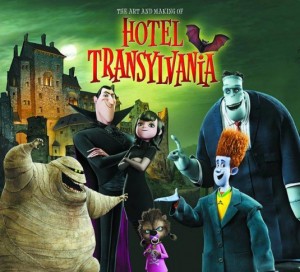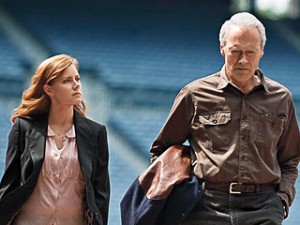What scared me most about “Hotel Transylvania” was the prospect of another film starring Adam Sandler and Andy Samberg. Their last collaboration was “That’s My Boy,” by far the most excruciatingly painful experience I’ve had at a theater this year. Thankfully, just providing voices for this PG animated horror comedy written by five other people, Sandler and Samberg are charming. It is a sweet, funny story about monsters who want to enjoy a peaceful life far from humans and the human who finds them anyway.
Sandler plays Count Dracula, a doting if over-protective vampire father who builds the hotel as a refuge so he and his daughter Mavis (Selena Gomez) can be safe from scary people with their pitchforks and torches. Dracula croons a tender lullaby: “Hush little baby, don’t say a word, papa’s going to bite the head off a bird.” Next to the changing table is a coffin-shaped diaper pail.
Mavis gets a little older, with cute little baby tooth fangs, and her caped father makes sure she’s wearing a helmet before he teaches her how to transform into a bat and fly. The hotel is a castle surrounded by a haunted forest and a graveyard populated by the undead. “Human-free since 1898,” the hotel proudly proclaims. And so things stay for over a century.
This Dracula has no need for human blood (“it’s so fatty and you don’t know where it’s been”). He relies on synthetic. All he wants is to take care of his guests, give his daughter a wonderful 118th birthday party, make sure she never leaves home, and never, ever see a human. But then, just as all of the monsters have arrived for the party, an easy-going bro with an enormous back-pack walks in. His name is Jonathan (Samberg), he thinks the monsters are cool, and he likes Mavis’ goth-girl vibe. This is worse than torches and pitchforks. A human who wants to get rid of monsters is one thing but a daughter who might fall in love with one is even scarier. And yes, there a wink at “Twilight.”
Of the three animated horror 3D comedies this fall, “Hotel Transylvania” is the least aesthetically ambitious, the most accessible for younger children, and the closest to the comfortingly silly scares of “Scooby-Doo.” Like this film, “ParaNorman” (now in theaters) and “Frankenweenie” (opening next week), the focus is on showing us that what we think is scary really is not very frightening after all. Of the three, this one has more all-out comedy, much of it coming from the monster-fied setting and the ghoul-ification of ordinary life. At Hotel Transylvania, the Do Not Disturb signs hanging from the doorknobs are shrunken heads — very outspoken ones. Mavis likes to eat “scream” cheese, which amusingly rises up from the cracker to let out a squeal as she takes a bite. Guests are greeted by zombie bellman, a Jack Pumpkinhead doorman, and a skeleton mariachi band with hats and sarapes. When the Invisible Man (David Spade) attempts to play charades, it is a hoot.
First-time director Genndy Tartakovsky was a storyboard artist on films like “Iron Man 2,” so he has an exceptional understanding of the mechanics and timing of the action sequences, and 3D adds a vertiginous thrill to a chase on flying tables and a touch of claustrophobia to a maze of underground corridors. It is telling that both of those highlights involve the most vivid vampire/human relationship at the heart of the story — Dracula and Jonathan. Despite a lot of talk about romantic “zing,” the bromance is much more real than the love story. And when they leave the castle for that most overused of climax cliches, the race to the airport, the story sags.
Top voice talent includes Kevin James as a sweet-natured Frankenstein and Fran Drescher as his bride, Steve Buscemi and Molly Shannon as the Wolf couple with innumerable cubs, and Ceelo Green as the outgoing Mummy. But the real stars are character designers Carter Goodrich (“Despicable Me”), Greg Kellman (“Madagascar”), and Carlos Grangel (“King Fu Panda”), whose monsters pay affectionate homage to their origins but are so endearing that families may want to pay a visit to have room service deliver an order of scream cheese.

Parents should know that the monsters in this movie are intended to be more funny than scary but there are some grotesque and macabre images that may be frightening to young or sensitive children as well as some potty humor and peril.
Family discussion: Why was Dracula so afraid to let Mavis leave home? How can parents know when their children are ready for more responsibility? Which monster was your favorite?
If you like this, try: “ParaNorman,” “Monster House,” “Monsters vs. Aliens,” and “Scooby-Doo”
 A dog named Gabe plays Cupid for his newly single master in this sweet family-friendly story. Gabe belongs to Eric (Brian Krause of “Charmed”) a journalist planning a move to the UK. But animals have to be quarantined for six months before they can enter the country and Gabe really doesn’t want that. So he has to figure out a reason for Eric to stay home, and decides his best bet is to find him a new girlfriend. A pretty neighbor named Sarah (Boti Bliss of “CSI: Miami”) seems like a good candidate. There are complications along the way but Gabe is on hand to make sure that it all ends happily ever after.
A dog named Gabe plays Cupid for his newly single master in this sweet family-friendly story. Gabe belongs to Eric (Brian Krause of “Charmed”) a journalist planning a move to the UK. But animals have to be quarantined for six months before they can enter the country and Gabe really doesn’t want that. So he has to figure out a reason for Eric to stay home, and decides his best bet is to find him a new girlfriend. A pretty neighbor named Sarah (Boti Bliss of “CSI: Miami”) seems like a good candidate. There are complications along the way but Gabe is on hand to make sure that it all ends happily ever after.


